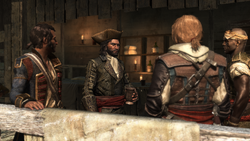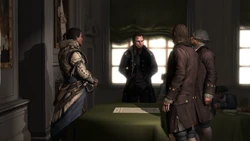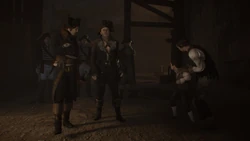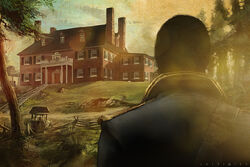| Line 19: | Line 19: | ||
[[File:King's Return.png|thumb|250px|left|The crowning of Charles II]] |
[[File:King's Return.png|thumb|250px|left|The crowning of Charles II]] |
||
| − | - The English Civil War was a conflict between people who defended the absolutist monarchy, defended by [[Charles I of England|Charles I]] and [[Charles II of England|Charles II]], and people who advocated parliamentarism, defended by [[Oliver Cromwell]]. King Charles I was executed by the parliamentarians, and thus established the Commonwealth. |
+ | - The English Civil War was a conflict between people who defended the absolutist monarchy, defended by [[Charles I of England|Charles I]] and [[Charles II of England|Charles II]], and people who advocated parliamentarism, defended by [[Oliver Cromwell]]. King Charles I was executed by the parliamentarians, and thus established the Commonwealth. After this revolution the country no longer used to be controlled by nobles and priests, the people had a new owner called bourgeoisie. |
- The Glorious Revolution was when {{Wiki|James II of England|King James II}} of the {{Wiki|House of Suart}} was removed from the throne and replaced by his daughter Mary, and by the dutch nobleman {{Wiki|William III of England|William of Orange}}. |
- The Glorious Revolution was when {{Wiki|James II of England|King James II}} of the {{Wiki|House of Suart}} was removed from the throne and replaced by his daughter Mary, and by the dutch nobleman {{Wiki|William III of England|William of Orange}}. |
||
Revision as of 19:36, 12 July 2018

|
Ezio, my friend! How may I be of service? This article is in desperate need of a revamp. Please improve it in any way necessary in order for it to achieve a higher standard of quality in accordance with our Manual of Style. |
The Age of Enlightenment, also known as the Enlightenment for short or the Age of Reason, was an intellectual movement in Europe that spanned throughout the 18th century. It promoted many revolutionary ideas at the time that commonly espoused rationality as the primary source of authority, dramatically shifting European culture towards the ideals of natural rights, liberty, constitutional government, and scientific advancement. In this light, it echoed the Renaissance, the cultural movement that preceded it centuries earlier. The movement's widespread popularity in Europe served as a major catalyst for calls for democracy, culminating in waves of republican revolutions that overturned the feudal, monarchic regimes of the past.
History
The Renaissance was the period that lasted from the 15th to the 17th century, in this movement stood out ideas such as humanism, individualism, and the recovery of values of Classical Antiquity. In the following century, the movement had continued.
England
- Main article: English Civil War
One of the early stages of the Enlightenment was the English Civil War and the Glorious Revolution that occurred in the Kingdom of England, 39 years after Elizabeth's death.

The crowning of Charles II
- The English Civil War was a conflict between people who defended the absolutist monarchy, defended by Charles I and Charles II, and people who advocated parliamentarism, defended by Oliver Cromwell. King Charles I was executed by the parliamentarians, and thus established the Commonwealth. After this revolution the country no longer used to be controlled by nobles and priests, the people had a new owner called bourgeoisie.
- The Glorious Revolution was when King James II of the House of Suart was removed from the throne and replaced by his daughter Mary, and by the dutch nobleman William of Orange.
On May 1, 1707, the England joined with Scotland, and together formed the United Kingdom of Great Britain.
West Indies
- Main article: Golden Age of Piracy

Pirates then reunited with Edward Kenway and Adéwalé.
At the beginning of the century, after the War of the Spanish Succession, the position of privateer was banned, besides the piracy, it has generated revolt by former privateers who began practicing criminal acts. At that same time the Republic of Pirates came to Nassau, which did not last long.
Pirates as Edward Thatch, also known as Blackbeard, Benjamin Hornigold, Charles Vane, Jack Rackham or Calico Jack, Anne Bonny and Mary Read had their notorities at this time, they were all associated with Edward Kenway, who later became an Assassin.
Thirteen Colonies
- Main article: American Revolution

The Founding Fathers signed the Declaration of Independence alongside the Assasssin Ratonhnhaké:ton.
In the second half of the century, after the Seven Years' War, many taxes were charged abusively to the people of the northern colonies. A faction known as the Sons of Liberty began to prostrate against these measures, so a wave of prostration began, one of them including the Boston Tea Party.
The British Empire ignored the claims, soon as the American Revolutionary War began, between the colony and its metropoli. On July 6, 1776, the colony finally realized its independence, and so the new nation, the United States of America, was born. The war for independence continued until 1783, with the result of the Siege of Yorktown.
The main thinkers of the time, were mostly Founding Fathers.
France
- Main article: French Revolution

The Assassin Arno Dorian faces the guards in the Bastille to escape.
Six years later, at the end of the 18th century, France came into crisis due to its actions in past wars. To fix the economy, Louis XVI programmed the Estates-General of 1789, at its meeting, there were three divisions:
- The First State: that was the nobility.
- The Second State: that was the clergy.
- The Third State: that was the greater part of the people.
During the meeting, the Third State was ignored, and the measures passed to prevail the First and Second States. After the meeting, the Third State was organized as a National Assembly, and soon revolts were promoted to the Paris and Versailles corridors. On July 14, 1789, there was the Storming of the Bastille, and that was the beginning of a bloody confrontation.

Louis XVI in the guillotine.
After the king was assassinated on January 21, 1793, two large factions gained notoriety and power across the country, the Girondists, a right-leaning party, who defended the interests of the bourgeoisie, and the Jacobins, a left-leaning party, led by Maximilien de Robespierre, were extreme extremists and persecuted anyone who was considered "an enemy of the revolution". The Robespierre's party promoted the Reign of Terror, where much of the french population was executed, but this lasted until the Thermidorian Reaction, the moment since Robespierre was captured, and ironically killed in the guillotine.

Napoleon searches for the Apple Eden in Saint-Denis.
After Robespierre's death, the French Revolutionary Wars continued to last against neighboring countries, in the meantime, a military named Napoleon Bonaparte, brought victories to the French Army in foes battles. Napoleon succeeded in embracing the people, in 1799, with the coup of the 18 Brumaire, he finally reached the french throne, later became emperor, and the French Empire was founded.
Rest of the World
After the events of the American and the French Revolution, southern colonies and other european countries also began to rebelling and adopt new customs:

The Assassin Eseosa travels to Davenport Homestead, seeking support from the Colonial Brotherhood.
- In Haiti, the local population, with the majority of African descent, rebelled against french crown, and the Haitian Revolution began, the leader was Toussaint Louverture, who defeated France and came to power in the country.
- In the Hispanic colonies, also began processes of emancipation against the Spanish Empire.
- The portuguese colony known as Brazil, had its independence on September 7, 1822.
- And other revolutions began in Europe in 1848.
